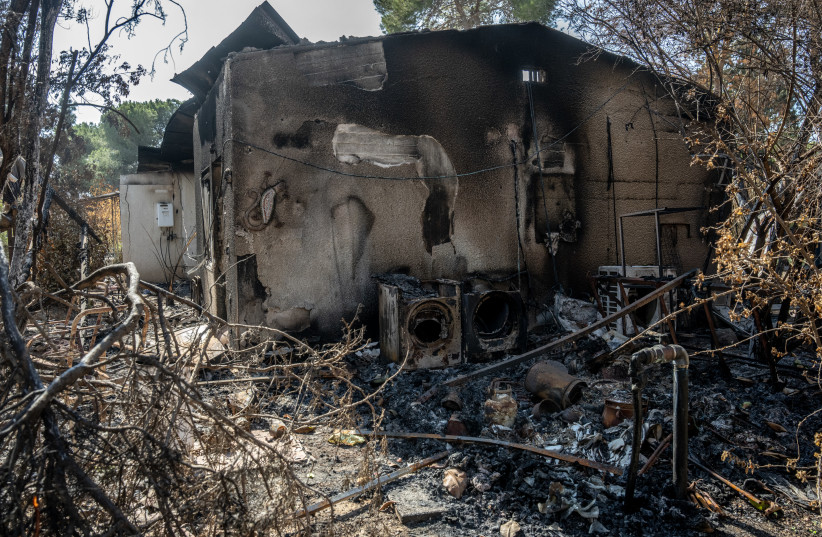Former Gaza hostage on captivity: Hamas used ‘psychological warfare’
Doron Katz Asher was taken as a hostage to Gaza with her mother and two daughters on October 7. She told her story in a Thursday interview with CNN, discussing the psychological warfare Hamas used on her and her two daughters while in captivity.
In the morning on October 7, Asher was visiting her mother and her mother’s partner, Gadi Moses (79), at Kibbutz Nir Oz, when the door burst open. Moses rushed out of the shelter so Hamas gunmen would not see the rest of them hiding inside. He was taken before another terrorist unit entered the house and took the four remaining women.
Asher (34), her mother and daughters, Raz (5) and Aviv (2), were thrown in the back of a tractor with other hostages from the kibbutz, when gunmen opened fire, Asher said. She was shot in her back, Aviv was shot in her leg and her mother was shot dead.
After being taken, Asher and her daughters were taken to a family’s home where they were first kept with a Gazan family. The three of them were watched over continuously by the children and grandchildren of the owner of the house. The father, who used to work in Israel, spoke Hebrew, and she was able to communicate with him.
Asher said that nobody gave them information about what was going on, saying she was told that Hamas “wants to release us but in Israel no one cares about us.” Asher also reported that they were told “that we won’t return to live in the kibbutz because it’s not our house – it’s not the place we belong.”

Asher told the interviewer that she did not believe them and the sound of fighting outside the building was how they knew that something was going on to get them back home.
“They stitched my wounds without anesthetic, on the couch while my girls were next to me,” Asher said.
She went on to explain how she tried to reassure her daughters that the danger was over by telling them that they are with good people who are “guarding us so we can return home.”
Asher and her daughters moved to a hospital in Khan Younis
After two weeks, Asher and her daughters were taken to a “so-called” hospital in Khan Younis. The interviewer asked why the hospital was “so-called.” Asher responded tat a hospital is a place that “is supposed to take care of people, but instead it was taken over by Hamas and they used it to hide hostages.”
Asher and her daughters were held in the hospital with other hostages. Her daughter, Aviv, fell sick with a fever, and was screaming in pain. Asher ran her head under cold water to make the fever go down. She received some medication for them but “it wasn’t enough.”
They remained in the hospital for nearly five weeks.
On the day that they were released, they were “smuggled” out of the hospital into a Hamas vehicle and she did not know where they were being taken. Asher said that she thought they were going to get lynched.
She said the streets were lined with thousands of civilians, including children and the elderly, trying to hit the car and knock on its windows.
Regarding the videos taken of hostages transferred to Red Cross vehicles, Asher said, “It’s one big show. Before I was released, the girls and I were barefoot for 50 days. We were cold because they were wearing short sleeves in November.” Asher said that before they were handed over to the Red Cross staff, they were given shoes and she was given a nice dress.
Traumatic impact remains
Once discharged and back home, the first thing Asher’s daughters did was go outside to feel the wind on their skin, since they had not seen daylight the entire time in Gaza.
As the family adjusts to being back home, the traumatic impact remained, she said.
“There was one day that they saw a tractor here and they asked if the evil men are here. I had to tell them no, the tractor doesn’t belong to the evil men,” Asher said, referring to her two daughters. “The tractor isn’t the thing that hurt you, it’s something we work with in the field, in construction.”
Asher told the interviewer that she has still not been able to mourn the loss of her mother, because she is still on autopilot. Her priority is caring for her daughters and ensuring that they are ok.
She is still concerned about the hostages that remain in Gaza, Asher noted. Among them, her mother’s partner who her daughters call “saba,” grandfather in Hebrew. He is almost 80 and does not have his medication with him, she added.





Comments are closed.